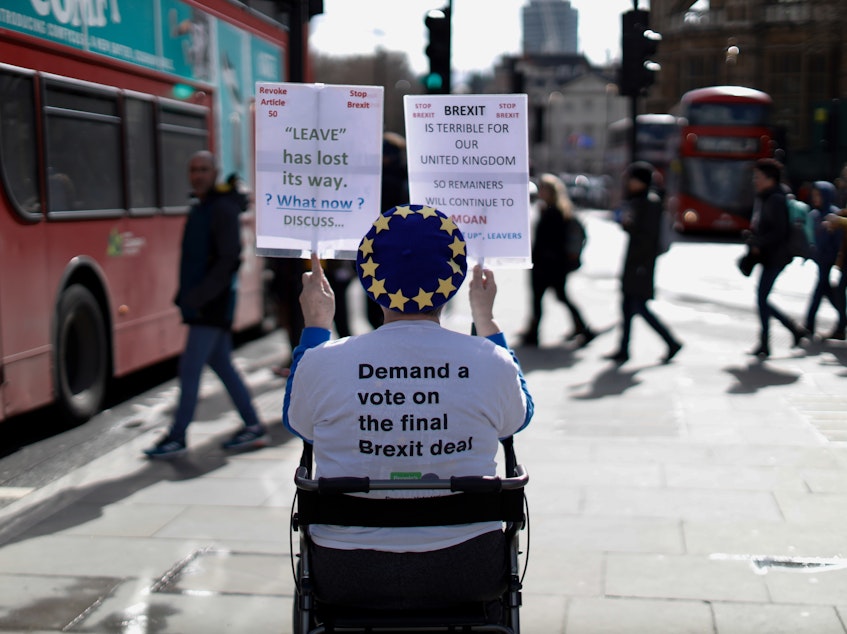U.K. Parliament To Vote On Postponing Brexit

Nearly three years since Britain voted to leave the European Union, everything has come down to the wire.
With 15 days remaining until the U.K. is to leave the EU, members of parliament have twice roundly rejected deals that Prime Minister Theresa May has put before them — and they've also rejected leaving without a deal.
But May is pushing for yet another vote, hoping for a more favorable outcome. On Thursday, Parliament will vote on whether it wants to ask the EU for more time to figure out a plan – and how much time it wants to ask for.
The difference between a short delay and a long one could be significant.
May is in favor of only a short delay, if any. Her government says that a delay until June 30 is possible if Parliament approves a deal by March 20. That's the day before an EU Summit in Brussels, where member nations could vote to give the U.K. an extension. May has warned members of Parliament that a long delay could mean no Brexit at all.
Sponsored
The other EU members, 27 in all, would need to approve an extension. Britain will need to show how it could use more time to find a way forward, when it has so little to show for two-plus years of political infighting.
"The EU has done everything it can to help get the Withdrawal Agreement over the line," the EU's chief negotiator, Michael Barnier, said after May's revised deal failed on Tuesday. "The impasse can only be solved in the UK. Our 'no-deal' preparations are now more important than ever before."
But there are signs that the EU might be willing to give Britain a longer extension. Donald Tusk, president of the European Council, tweeted on Thursday that he "will appeal to the EU27 to be open to a long extension if the UK finds it necessary to rethink its Brexit strategy and build consensus around it." Brexiteers see Tusk's "long extension" as a threat designed to force them into backing May's plan.
A long extension could mean more time to work out a deal. It could also mean a second referendum on leaving the EU, or a general election.
The pressure on May to deliver any sort of resolution – or perhaps step down — is growing. And it's been a very long week for the embattled prime minister. On Tuesday, Parliament soundly rejected the plan she had worked out with the EU. The vote was 391-242.
Sponsored
Wednesday's vote was on whether Britain should leave the EU without a deal at the end of March — or any day in the future. The answer was no, by 321 votes to 278. That was no surprise: many worry that leaving the EU without a deal will plunge Britain into chaos, with goods held in limbo and the possibility of food and medicine shortages.
May is desperately urging Parliament to approve the deal she has brokered with the EU, warning that a better deal will not be forthcoming. Members have shown what they're against, she says, but have not said what they're for.
Her own party is fracturing, as evidenced by the failure of her proposals this week as well as resignations and abstentions within her own Cabinet. A group of arch Brexiteers continues to push for a hard Brexit – not only leaving the bloc, but also the EU's single market and its customs union.
A key sticking point in any Brexit deal has been how to avoid a hard border — including customs inspections — between Northern Ireland (part of the UK) and Ireland (a member of the EU). In an effort to ensure that border stays open, the UK's withdrawal agreement includes a measure known as the "Irish backstop" that would keep the UK effectively within the EU customs union and Northern Ireland part of the single market.
But some worry that the backstop would end up permanently locking Britain into the EU customs union. The prime minister got some reassurances from EU leaders on Monday night that this wouldn't occur, but the UK's attorney general said Tuesday that the possibility of the backstop becoming permanent had not been eliminated. For some members of Parliament who had been weighing whether to support May's deal, that opinion sealed their opposition.
Sponsored
MPs will be voting all afternoon, and possibly into the evening, on a series of proposals and amendments.
May's strategy in recent months has been a risky one: waiting until the last moment to try to force through a plan when the stakes cannot get any higher. That last moment has arrived. [Copyright 2019 NPR]



